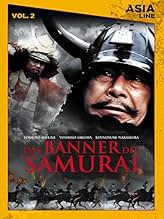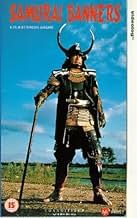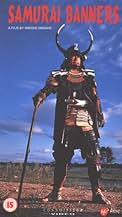Agrega una trama en tu idiomaA shrewd 16th Century samurai helps a daimyo expand his realm.A shrewd 16th Century samurai helps a daimyo expand his realm.A shrewd 16th Century samurai helps a daimyo expand his realm.
- Dirección
- Guionistas
- Elenco
Kanzaburô Nakamura
- Katsuyori Takeda
- (as Kankurô Nakamura)
Kôji Nanbara
- Ronin
- (sin créditos)
- Dirección
- Guionistas
- Todo el elenco y el equipo
- Producción, taquilla y más en IMDbPro
Opiniones destacadas
I find myself a little surprised, and taken aback. There is an unsubtle directness in the writing that's actually kind of jarring and off-putting as bare-faced dialogue and scenes advance the plot in a blunt, stilted, and almost forceful manner. Despite the presumed complexity of characters who would scheme, stand opposed in various ways, and find themselves in complicated relationships, these figures feel flat and maybe even uninspired as they present, as if they weren't fleshed out any more than the dialogue and scenes seem to be. Just as the narrative at large is impacted, I believe these sensibilities also extend to the direction of Inagaki Hiroshi - confounding, coming from the man behind such stellar, refined classics as the "Samurai trilogy" of the mid-50s. In orchestrating scenes and guiding his cast Inagaki here lacks the patient polish and finesse he has demonstrated elsewhere, and 'Samurai banners' is prone to a brusqueness that's frankly unseemly when stood next to the many esteemed jidaigeki that came from the 50s, 60s, and 70s in particular. The thoughtful, deliberate craftsmanship and storytelling is diminished if not absent, further observed in instances of cinematography, editing, gawky on-screen text and graphics, and even the acting; icon that he remains, even Mifune Toshiro seems bound and restricted by such traits.
It's hardly that this picture is bad. Yet while it was surely fashioned with the same skill and intelligence as its kin, the same level of care was plainly not applied, and the relative weaknesses and shortcomings are plainly evident. The story has potential on paper but is shortchanged in realization, and is not as strong as it might have been; the writing is sometimes altogether troubled, and the direction and acting struggle to impress. Scattered moments that are unquestionably more sure-footed (e.g., in a short scene between Princess Yu and Yamamoto a bit after the one-hour mark) only get us so far, and likewise the contributions of those operating behind the scenes. The filming locations are lovely, and the sets as well; fine attention went into the costume design, hair, and makeup. Even if it sometimes feels out of place, I greatly appreciate Sato Masaru's score in and of itself. Where stunts, effects, fight choreography, and action sequences are employed they broadly look fantastic. Be that as it may, we can get these elements elsewhere, and respectfully, they are not necessarily the most important factors in determining the success of a feature. And as those most important factors are at best variable in their quality, the subsequent effect on the viewing experience is sadly one of partial enfeeblement.
My words have intoned criticism more than praise, and that's not quite right. More than not 'Samurai banners' is well made, and enjoyable. Nevertheless, the rough edges that define its construction quash much of what weight the saga should carry, not least as the writing also commonly fails to communicate the significance of the course of events, even including battles. Moreover, I wonder if that difficulty isn't worse in the second half. Where the movie adds dramatic flourish to accentuate a beat, it feels overdone and false. We all know what great capabilities were possessed by all who participated here, and still I don't think this is an especially worthy representation of them - more like a facsimile in which the fidelity of the ideal form has been lost. Though still suitably worthwhile on its own merits, even at its best this could only earn a soft recommendation when stood next to any kindred works, and maybe even that's a tad too kind. Watch if you have the opportunity, sure, but don't go out of your way for it, and be aware that even with Inagaki and Mifune on hand, among many celebrated others, this has faults which distinctly hold it back.
It's hardly that this picture is bad. Yet while it was surely fashioned with the same skill and intelligence as its kin, the same level of care was plainly not applied, and the relative weaknesses and shortcomings are plainly evident. The story has potential on paper but is shortchanged in realization, and is not as strong as it might have been; the writing is sometimes altogether troubled, and the direction and acting struggle to impress. Scattered moments that are unquestionably more sure-footed (e.g., in a short scene between Princess Yu and Yamamoto a bit after the one-hour mark) only get us so far, and likewise the contributions of those operating behind the scenes. The filming locations are lovely, and the sets as well; fine attention went into the costume design, hair, and makeup. Even if it sometimes feels out of place, I greatly appreciate Sato Masaru's score in and of itself. Where stunts, effects, fight choreography, and action sequences are employed they broadly look fantastic. Be that as it may, we can get these elements elsewhere, and respectfully, they are not necessarily the most important factors in determining the success of a feature. And as those most important factors are at best variable in their quality, the subsequent effect on the viewing experience is sadly one of partial enfeeblement.
My words have intoned criticism more than praise, and that's not quite right. More than not 'Samurai banners' is well made, and enjoyable. Nevertheless, the rough edges that define its construction quash much of what weight the saga should carry, not least as the writing also commonly fails to communicate the significance of the course of events, even including battles. Moreover, I wonder if that difficulty isn't worse in the second half. Where the movie adds dramatic flourish to accentuate a beat, it feels overdone and false. We all know what great capabilities were possessed by all who participated here, and still I don't think this is an especially worthy representation of them - more like a facsimile in which the fidelity of the ideal form has been lost. Though still suitably worthwhile on its own merits, even at its best this could only earn a soft recommendation when stood next to any kindred works, and maybe even that's a tad too kind. Watch if you have the opportunity, sure, but don't go out of your way for it, and be aware that even with Inagaki and Mifune on hand, among many celebrated others, this has faults which distinctly hold it back.
After watching Samurai Banners, I was struck with one piece of dialog which sums up the film quite nicely, "In this age of war, survival requires complex conspiracies, secret dealings, and assassinations. They're inevitable." These two lines help describe the atmosphere of 16th century Japan, in which Samurai Banners is set. A Japan divided by warring factions and lords, where treachery and war are the only way of life.
Yamamoto Kansuke (Mifune) is a ronin, who through chance of fate finds himself protecting Lord Takeda's vassal from another Ronin (in a very bloody exchange). Kansuke then moves to the province of Kai, where Lord Takeda awards him a troop of 100 soldiers. Once established Kansuke moves his way up to be Lord Takeda's top military adviser. With Kansuke's help the province of Kai stretches it's grasp to the other provinces through a series of, "complex conspiracies, secret dealings, and assassinations." Samurai Banners is an intricately researched samurai epic. The outfits are incredible, especially Mifune's fearsome black samurai armor which boasts the most incredible helmet I've ever seen. The outfits of the Red Guard are also very impressive and help add to the allure of the film. The set's also match the intensity of the outfits and this film highly succeeds in painting an accurate picture of 16th century Japan.
Mifune is as bad-ass as ever (Of course!) but this time around he sports (besides the crazy armor) a ugly scar, a noticeable limp, and a awesome moustache. In Samurai Banners he plays the "terrifying" Kansuke, a man who is both feared and revered by his troops. In typical Mifune fashion, his one soft spot is for a woman named Pricess Yu. Both the Lord's concubine and an unrequited love interest for Kansuke.
The film itself stays true to the tradition of 60's chambara; a mix of action, romance, war tactics, and character development, which together, helps round out another solid entry for both Mifune and Director Inagaki Hiroshi. The film substitutes most of the battles for the strategies and goings on of the Lord's and his advisor's, although the film has its share of action don't go into this expecting an action packed Chambara flick.
Bottom Line- Good historical war epic with a focus on the people involved more-so than the actual battles. Mifune is a bad as ever!
Yamamoto Kansuke (Mifune) is a ronin, who through chance of fate finds himself protecting Lord Takeda's vassal from another Ronin (in a very bloody exchange). Kansuke then moves to the province of Kai, where Lord Takeda awards him a troop of 100 soldiers. Once established Kansuke moves his way up to be Lord Takeda's top military adviser. With Kansuke's help the province of Kai stretches it's grasp to the other provinces through a series of, "complex conspiracies, secret dealings, and assassinations." Samurai Banners is an intricately researched samurai epic. The outfits are incredible, especially Mifune's fearsome black samurai armor which boasts the most incredible helmet I've ever seen. The outfits of the Red Guard are also very impressive and help add to the allure of the film. The set's also match the intensity of the outfits and this film highly succeeds in painting an accurate picture of 16th century Japan.
Mifune is as bad-ass as ever (Of course!) but this time around he sports (besides the crazy armor) a ugly scar, a noticeable limp, and a awesome moustache. In Samurai Banners he plays the "terrifying" Kansuke, a man who is both feared and revered by his troops. In typical Mifune fashion, his one soft spot is for a woman named Pricess Yu. Both the Lord's concubine and an unrequited love interest for Kansuke.
The film itself stays true to the tradition of 60's chambara; a mix of action, romance, war tactics, and character development, which together, helps round out another solid entry for both Mifune and Director Inagaki Hiroshi. The film substitutes most of the battles for the strategies and goings on of the Lord's and his advisor's, although the film has its share of action don't go into this expecting an action packed Chambara flick.
Bottom Line- Good historical war epic with a focus on the people involved more-so than the actual battles. Mifune is a bad as ever!
Samurai Banners (1969) is Hiroshi Inagaki's, know for The Samurai: Musashi Miyamoto trilogy, crowning achievement-a nearly three hour historically based epic starring Toshiro Mifune as a ronin determined to achieve greatness in his new clan by uniting Japan under one ruler. The story is based on a novel adapted by Shinobu Hashimoto (Rashomon and Seven Samurai) and takes place in the Sengoku warring period 1500-1600. At the time it was the most expensive Japanese film produced with several massive fight scenes that must have been expensive to stage. It immediately calls to mind Akira Kurosawa's two late samurai epic masterpieces Kagemusha and Ran. I wonder why he wasn't involved in the project that was made with his former leading man and the script writer of his greatest triumphs. Nonetheless, Inagaki with cinematographer Kazuo Yamada has created a stylish, colorful, and dynamic film.
Lots of attention to historical detail, like the horned kabuto worn by Yamamoto Kansuke. Climactic battle (4th Kawanakajima)between the Takeda and Uesugi well worth seeing. Story told from the viewpoints of Kansuke and his overlord, Takeda Shingen. I liked this a lot more than the 1990 "Heaven and Hell," which retold the story of the rivalry between Takeda Shingen and Uesugi Kenshin, but from Kenshin's viewpoint. For example, the later movie seemed less accurate and more artsy (each side's soldiers all wore the same standard-color sashimono)in its depiction of the same battle.
It should be noted that this DVD was about 20 minutes shorter than the time listed on IMDb. I assume that a bit of it was trimmed for the American and Canadian DVD release. While this is regrettable, the DVD producers fortunately decided not to dub the film but presented it with subtitles--something far preferable to most cinemaniacs.
As for the film, it's a historical drama about Shingen Takeda's attempt to conquer medieval Japan. In particular, it focuses on his right hand man, Kansuke Yamamoto (Toshirô Mifune), who doggedly pushed his master (Takeda) to be very cunning and amoral in his pursuit of power. Yamamoto was a great strategist and he and Takeda were of one mind during most of the film. Only later in the film does Takeda try his own plan.
Along the way, a headstrong princess is captured. While Yamamoto was always loyal, it seemed as if unresolved sexual tension existed between him and the princess. Yamamoto's fanatical loyalty to her and her son were evidence of his attraction to her--particularly when he could have sided with Takeda's wife.
While there is some of the film concerns life behind the scenes, much of it had to do with one battle after another as well as showing details of the battle plans in the later battles. All this makes the film great for military strategists and people who love war films, but it also makes the film a bit stale--taking away some of the heart of the film. Frankly, after a while I found myself really respecting the film for its attention to detail but also feeling disconnected as a result of all the battles. I also think that if you are very, very well-versed with medieval Japanese history this all might be a bit more interesting. I have more knowledge than 99% of the Americans that might watch this film since I have been a history teacher, but some of the subtleties of the film still eluded me. Because of this, it's important to watch the included "program notes" BEFORE you see the film. I did, however, like the arrow in the eye near the end.
Overall, a very well made but standard war picture. If you love war films (and I don't), you'll enjoy this one. If not, then it might be a bit of a chore to watch--especially since it's about three hours long.
As for the film, it's a historical drama about Shingen Takeda's attempt to conquer medieval Japan. In particular, it focuses on his right hand man, Kansuke Yamamoto (Toshirô Mifune), who doggedly pushed his master (Takeda) to be very cunning and amoral in his pursuit of power. Yamamoto was a great strategist and he and Takeda were of one mind during most of the film. Only later in the film does Takeda try his own plan.
Along the way, a headstrong princess is captured. While Yamamoto was always loyal, it seemed as if unresolved sexual tension existed between him and the princess. Yamamoto's fanatical loyalty to her and her son were evidence of his attraction to her--particularly when he could have sided with Takeda's wife.
While there is some of the film concerns life behind the scenes, much of it had to do with one battle after another as well as showing details of the battle plans in the later battles. All this makes the film great for military strategists and people who love war films, but it also makes the film a bit stale--taking away some of the heart of the film. Frankly, after a while I found myself really respecting the film for its attention to detail but also feeling disconnected as a result of all the battles. I also think that if you are very, very well-versed with medieval Japanese history this all might be a bit more interesting. I have more knowledge than 99% of the Americans that might watch this film since I have been a history teacher, but some of the subtleties of the film still eluded me. Because of this, it's important to watch the included "program notes" BEFORE you see the film. I did, however, like the arrow in the eye near the end.
Overall, a very well made but standard war picture. If you love war films (and I don't), you'll enjoy this one. If not, then it might be a bit of a chore to watch--especially since it's about three hours long.
Selecciones populares
Inicia sesión para calificar y agrega a la lista de videos para obtener recomendaciones personalizadas
Detalles
- Tiempo de ejecución
- 2h 45min(165 min)
- Mezcla de sonido
- Relación de aspecto
- 2.35 : 1
Contribuir a esta página
Sugiere una edición o agrega el contenido que falta


























